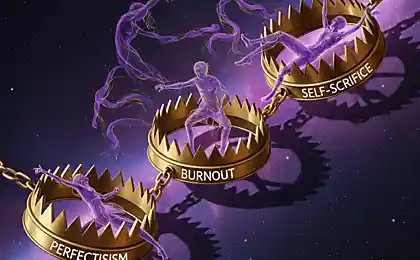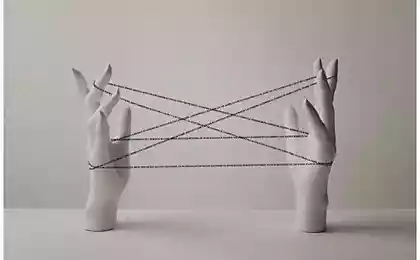161
11 Signs Your Girl Expects Too Much From You

When a relationship turns into hard work and overwhelming burden, the problem may be that the girl is demanding too much of you. Psychologists call this phenomenon emotional burnout in relationships, which can seriously undermine the mental health and self-esteem of a partner.
Healthy relationships are built on mutual respect, understanding and reasonable expectations. However, when the balance is disturbed, one partner may find himself in a situation of constant stress, trying to meet unrealistic requirements. According to research by psychologists from the University of Rochester, high expectations in relationships are one of the main causes of breakups among young couples.
True love does not require sacrifices that destroy the individual. It inspires growth, not makes you dissolve in the needs of others.
The Psychological Roots of High Expectations
High expectations in relationships often have deep psychological roots. They can arise from childhood trauma, unmet security needs, or a distorted view of romantic relationships shaped by popular culture.
It's important to understand: The problem is not that the person has needs, but that those needs become excessive and destructive to the relationship. The distinction between healthy boundaries and toxic demands is at the heart of a harmonious relationship.

11 Key Signs of High Expectations
Continuous monitoring of time
She demands a detailed account of every minute of your day, checks your messages, calls every half hour. This is not a concern, but an attempt at total control. Healthy relationships require trust and personal space.
Financial dependency as the norm
She expects you to pay all of her expenses, from makeup to vacations with her friends. In this case, his own earnings are considered exclusively his personal money. This is a sign of a consumer attitude.
Emotional blackmail
Phrases like “If you love me, you will...” or threats of tearing up every time you disagree. Guilt manipulation is a toxic pattern of behavior that destroys trust.
Impairing your achievements
Your success at work or in a hobby is not noticed or diminished. But their own minimal achievements are presented as great achievements. It's a sign of narcissistic behavior.
Isolation from friends and family
She finds flaws in all your loved ones, creates conflicts, requires a choice between her and her friends. Healthy relationships do not require a break in social ties.
Limitless demands for attention
You have to be available 24/7, respond to messages instantly, cancel plans for her whims. Your own needs for rest and personal time are ignored.
Criticism as a way of communication
Constant remarks about appearance, behavior, choice of clothes. Constructive criticism is aimed at improving, and toxic criticism is aimed at suppressing self-esteem.
Double standards
What is allowed to her is forbidden to you. She can communicate with exes, but she forbids you. He may be late, but he's making a fuss about your five minutes delay.
Ignoring your boundaries
When you say “no” or “I feel uncomfortable,” it’s perceived as aggression or selfishness. Your borders are not respected and constantly violated.
Turning into a personal psychologist
You become the only person who has to solve all her problems, calm her down, give advice. At the same time, your feelings are ignored.
Constant dissatisfaction
Whatever you do, it's never enough. Gifts are wrong, attention is not enough, your efforts are not appreciated. This is a sign that the problem is not with you, but with high expectations.
Red flag: If you recognize your situation in the described signs, this is a serious reason for reflection. Remember, a healthy relationship should bring joy, not drain emotionally.
Impact on mental health
Staying in relationships with high expectations leads to serious mental health consequences. Studies show that men in such relationships often suffer from anxiety disorders, depression and low self-esteem.
Dr. John Gottman, a well-known relationship researcher, has found that criticism and contempt in relationships are among the top predictors of a breakup. These elements are often present in situations of high expectations.
Practical strategies for solving the problem
1. Establishing healthy boundaries
The first step is to clearly define what you are willing to accept and what you are not. The boundaries should be voiced calmly but firmly. For example, “I’m willing to support you, but I can’t be available 24 hours a day.”
Psychological advice: Write down your boundaries on paper. This will help to formulate them clearly and not to retreat under pressure.
2. Greystone technique
When trying emotional blackmail, be as neutral as possible. Short, monosyllabic answers without emotion. This deprives the manipulator of fuel to continue the pressure.
3. Documenting behaviour
Keep an incident diary. Write down dates, times and descriptions of situations. This will help you see patterns of behavior and protect yourself from gaslighting.
4. Seeking support
Don't isolate yourself from friends and family. Support for loved ones is critical for restoring adequate self-esteem and obtaining an objective assessment of the situation.
Remember: It is impossible to change another person. You can only change your reaction to his behavior and decide if you are willing to put up with the current situation.
When it's time to leave
Some situations cannot be corrected. If, after setting boundaries and open conversations, the behavior does not change, but only worsens, it can be a sign of a toxic relationship.
Psychologists recommend seriously considering a breakup if:
- Your physical or mental health is deteriorating.
- You lost touch with friends and family.
- Financial well-being at risk
- Threats or physical aggression
- You feel like a hostage in a relationship.
Conclusion
A healthy relationship is a partnership of equals where each person maintains their individuality and respects the boundaries of the other. High expectations destroy this harmony, turning love into a toxic addiction.
Remember, you deserve a relationship that brings joy, support and inspiration. Don’t be afraid to defend your boundaries and make difficult but necessary choices for your own well-being.
Glossary of terms
gaslighting A form of psychological abuse in which one person causes another to doubt their own perception of reality.
Emotional burnout A state of physical and emotional exhaustion caused by prolonged stress in a relationship.
Toxic relationships Relationships that harm the mental or physical health of one or both partners.
Relationship boundaries Clear rules and restrictions that a person sets to protect their well-being.
Emotional blackmail Using feelings of guilt, fear, or commitment to coerce certain behaviors.
Narcissistic behavior Excessive self-admiration and the need for constant admiration, often at the expense of others.
Codependency Dysfunctional relationships in which one person completely subordinates their needs to the needs of another.
10 Masculinity Masks You Use and How Not to Lose Your Self
5 familiar things that will soon disappear























